Related Research Articles
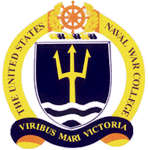
The Naval War College is the staff college and "Home of Thought" for the United States Navy at Naval Station Newport in Newport, Rhode Island. The NWC educates and develops leaders, supports defining the future Navy and associated roles and missions, supports combat readiness, and strengthens global maritime partnerships.

Henry Kent Hewitt was the United States Navy commander of amphibious operations in north Africa and southern Europe through World War II. He was born in Hackensack, New Jersey and graduated from the United States Naval Academy in 1907. His classmates included Jonas H. Ingram, George M. Courts, Claud A. Jones, and Willis W. Bradley.

Stephen Bleecker Luce was a U.S. Navy admiral. He was the founder and first president of the Naval War College, between 1884 and 1886.

John Brewster Hattendorf, D.Phil., D.Litt., L.H.D., FRHistS, FSNR, is an American naval historian. He is the author, co-author, editor, or co-editor of more than fifty books, mainly on British and American maritime history and naval warfare. In 2005, the U.S. Naval Institute Proceedings described him as "one of the most widely known and well-respected naval historians in the world." In reference to his work on the history of naval strategy, an academic in Britain termed him the "doyen of US naval educators." A Dutch scholar went further to say that Hattendorf "may rightly be called one of the most influential maritime historians in the world." From 1984 to 2016, he was the Ernest J. King Professor of Maritime History at the United States Naval War College in Newport, Rhode Island. He has called maritime history "a subject that touches on both the greatest moments of the human spirit as well as on the worst, including war." In 2011, the Naval War College announced the establishment of the Hattendorf Prize for Distinguished Original Research in Maritime History, named for him. The 2014 Oxford Naval Conference - "Strategy and the Sea" - celebrated his distinguished career on April 10–12, 2014. The proceedings of the conference were published as a festschrift. In March 2016, Hattendorf received the higher doctorate of Doctor of Letters (D.Litt.) from the University of Oxford. Among the few Americans to have received such designation, Hattendorf remained actively engaged on the Naval War College campus after his formal retirement in 2016.

The University of Bialystok is the largest university in the north-eastern region of Poland, educating in various fields of study, including humanities, social and natural sciences and mathematics. It has nine faculties, including a foreign one in Vilnius. Four faculties have been awarded the highest scientific category “A”. The University of Bialystok has the right to confer doctoral degrees in ten fields, as well as postdoctoral degrees in law, economics, chemistry, biology, history and physics.

The Naval Academy Preparatory School or NAPS is the preparatory school for the United States Naval Academy. NAPS is located on Naval Station Newport, Rhode Island. The mission of the Naval Academy Preparatory School is "To enhance Midshipman Candidates' moral, mental, and physical foundations to prepare them for success at the United States Naval Academy".
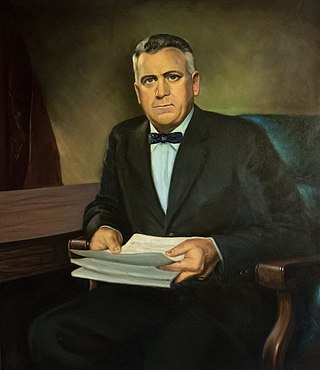
John Edward Fogarty was a Congressman from Rhode Island for 26 years. He was a member of the Democratic Party. John Edward Fogarty was influential in passing numerous legislations and acts. For his service he received awards and honors.

The National Fish and Wildlife Foundation (NFWF) is an American foundation that was chartered by Congress in 1984 to increase the resources available for the conservation of the nation's fish, wildlife, plants and habitats.
In May 1948, the President of the Naval War College Admiral Raymond Spruance recommended a plan to establish a civilian professorship of maritime history at the Naval War College. Approved by Secretary of the Navy John L. Sullivan (Navy) on 29 December 1948, the post was not filled “for lack of funds” until 1951, when Thomas C. Mendenhall of Yale University was appointed to the position. In 1953, Secretary of the Navy Robert Bernard Anderson named the chair in honor of Fleet Admiral Ernest J. King, recognizing King’s great personal interest in maritime history. The Ernest J. King chair was named and first filled during the tenure of Professor Clarence H. Haring. At that point, there was only one other named academic chair in the United States for the field of maritime history, that held by the Gardiner Professor of Oceanic History and Affairs established at Harvard University in 1948. The Naval War College’s first permanent long-term civilian faculty member came in 1966 and its larger civilian faculty began in 1972. Between 1951 and 1973, the King Chair was regularly held as a one-year visiting appointment. It became a permanent faculty appointment in 1974. The position reverted to a visiting professorship in October 2016.

This history of the University of South Carolina began in the 18th century when intersectional differences arose between the Lowcountry and the Upstate. It was conceived that a state supported college located in the center of the state at Columbia, South Carolina, would foster friendships between those of both regions thus allowing the state to present a united front to the nation when threatened with issues jeopardizing the South Carolina way of life. The University of South Carolina's history can be described in four distinct phases: a firebrand college (1801–1862), constant reorganization (1865–1891), college to university (1891–1944) and the state's university (1944–present).
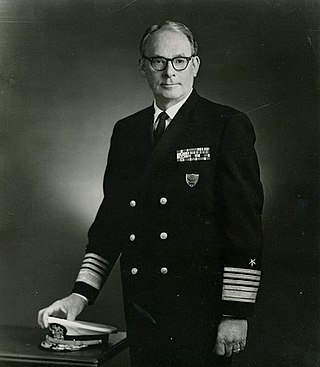
Richard Gary Colbert was a four-star admiral in the United States Navy who served as President of the Naval War College from 1968 to 1971, and as commander in chief of all NATO forces in southern Europe from 1972 to 1973. He was nicknamed "Mr. International Navy" as one of the very few senior admirals in the U.S. Navy identified with international naval cooperation during the Cold War.

The president of the Naval War College is a flag officer in the United States Navy. The President's House in Newport, Rhode Island is their official residence.
The Society of Colonial Wars is a hereditary society composed of men who trace their descents from forebears who, in military, naval, or civil positions of high trust and responsibility, by acts or counsel, assisted in the establishment, defense, and preservation of the mainland American colonies of Great Britain.

Admiral Thisara Sugeeshwara Gunasekara Samarasinghe RSP, VSV, USP, ndc, psc, DISS, MNI, SLN was the Commander of the Sri Lankan Navy from 15 July 2008 to 15 January 2011. He had a distinguished 36-year career in the Sri Lankan Navy. His career included a wide range of key appointments at sea and ashore, including training in the United Kingdom, India and the United States.
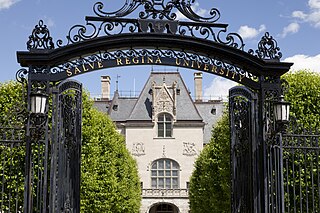
Salve Regina University is a private Roman Catholic university in Newport, Rhode Island, United States. It was founded in 1934 by the Sisters of Mercy and is accredited by the New England Commission of Higher Education. The university enrolls more than 2,700 undergraduate and graduate students annually.
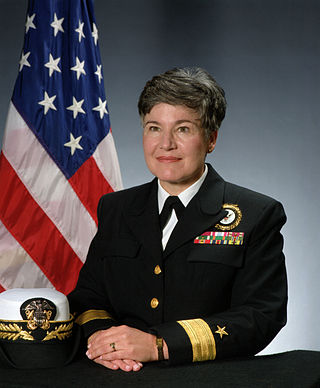
Retired Rear Admiral Barbara Elizabeth McGann was the executive director of the Advanced Math and Science Academy Charter School in Marlborough, Massachusetts until her retirement at the end of the 2010 – 2011 academic year. She was one of the first women to achieve two-star rank in the United States Navy.

Luke McNamee was a United States Navy Admiral, businessman, and the 10th and 12th Naval Governor of Guam. He served in the Navy for 42 years, during which time he held multiple commands. During the Spanish–American War, he earned the Navy Cross, and later the Legion of Honour.

Walter Edward Carter Jr. is an American retired United States Navy vice admiral and Naval Flight Officer and current academic administrator who is the president of the University of Nebraska System. Carter was confirmed by the university's board of regents as the eighth permanent president of the university on Dec. 5, 2019. He was the 62nd superintendent of the United States Naval Academy and 54th president of the U.S. Naval War College.
The Chief of Naval Operations Strategic Studies Group (SSG) was established by Chief of Naval Operations Admiral Thomas B. Hayward in 1981. The Group was co-located at the United States Naval War College in Newport, Rhode Island, and received its direction and made its reports only to the Chief of Naval Operations. The SSG was disestablished in 2016 by the Chief of Naval Operations (CNO) Admiral John Richardson.

Edward F. Welch Jr. was a rear admiral of the United States Navy active during much of the Cold War. His career included service as a submarine officer, positions related to nuclear warfare planning, arms control, and North Atlantic Treaty Organization affairs, and a tour as president of the Naval War College.
References
- ↑ Sailors and Scholars: The Centennial History of the Naval War College (Newport: Naval War College Press, 1984), pp. 268.
- ↑ "Our Mission".